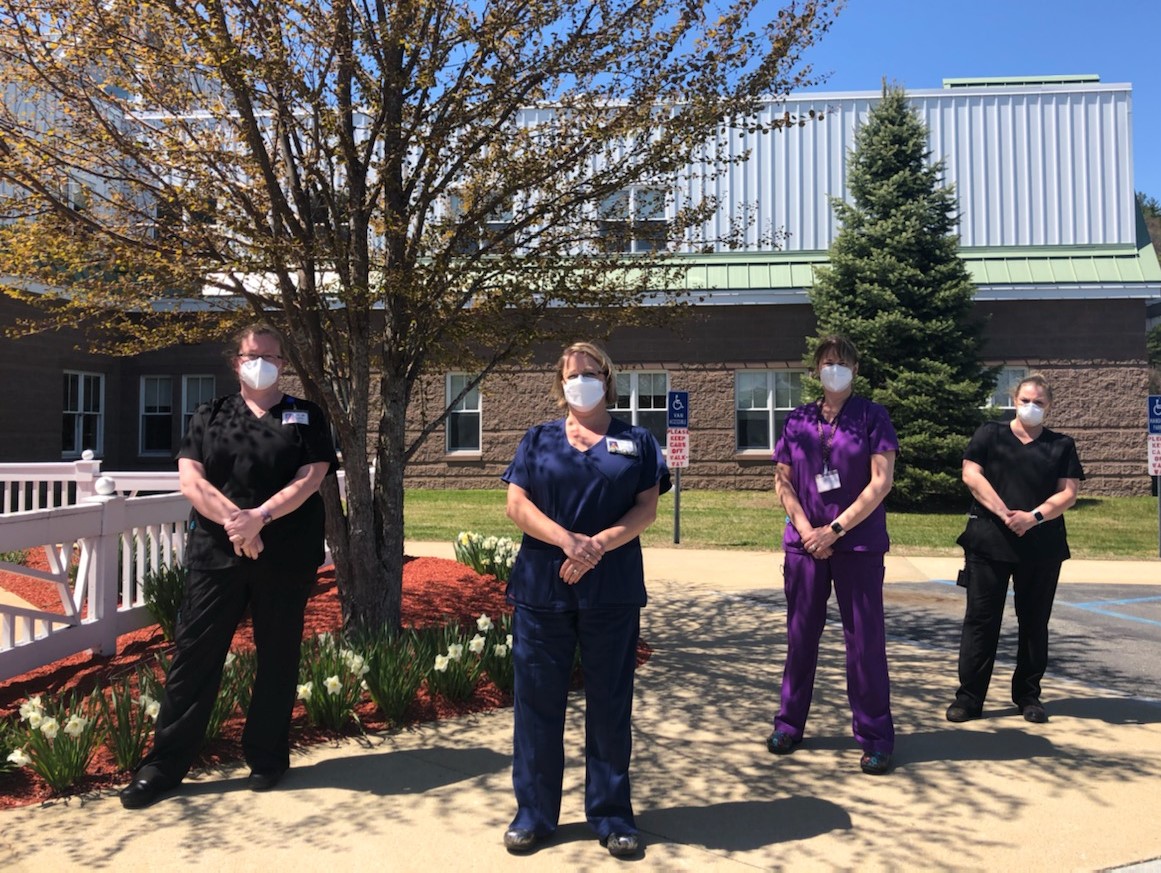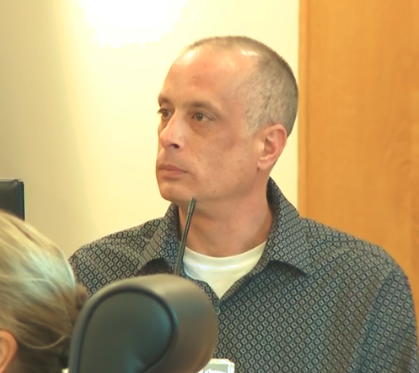By PAULA TRACY, InDepthNH.org
BOSCAWEN – New Hampshire’s 11 county-run nursing homes have not had a single outbreak of COVID-19 so far, according to state health records, and the staff at Merrimack County Nursing Home aims to keep it that way with their residents in Boscawen.
“We think we have a pretty good system down,” said Georgianna Morrill, a registered nurse at the Merrimack County Nursing Home.
Celebrating National Nurses Week recently when the sun was shining and the jonquils were in bloom outside the main entrance where she has worked for 20 years, Morrill was joined by Cathy Murdough, LPN, and LNAs Jessy Durand and Manique Haggett for a quick break to meet with InDepthNH.org.
The staff essentially forms a protective barrier from the world right now and they know their residents and their needs.
“We are a well-coordinated team,” Murdough said. “I enjoy every bit of it.”
At Friday’s news conference, state Health and Human Services Commissioner Lori Shibinette said she did not know why county-run homes haven’t experienced any outbreaks where 15 others around the state have seen outbreaks.
“Building-wise I don’t think there is any correlation between for-profit and nonprofit or county,” Shibinette said. “They all follow the same standards of care.”
When it comes to the segregation of the sick from the healthy residents, Shibinette said the facilities are all required to do that and are doing that.
“Some can do it better than others depending on their facilities,” she said, noting that the smaller nursing homes have more difficulty than larger ones as the larger nursing homes have many more units and can do it more easily.
Some states have tried to stand up COVID-19-only facilities but have had to stand down, in large part because of the difficulty finding adequate staff. The state already has a staffing challenge for nursing homes, she said.
“They are doing a really good job on managing a very difficult situation,” Shibinette said.
How It Works
Unlike most nursing homes, at Merrimack County Nursing Home, there is a wall separating each resident from their roommate. There are also nine units and dedicated staff for each.
Everyone at the facility lives in a room with a window out on to the rolling green landscape of central New Hampshire, with a view toward the foothills of the White Mountains.
During every shift (or 8-hour period), staffers take temperatures and vital signs of each of the residents in the 280-bed facility, of which 270 are occupied.
When, and if, a patient presents symptoms of the virus, such as high fever, shortness of breath, or coughing, they are immediately transported to another area of the compound to be isolated. Two weeks ago, such an incident occurred.
Fever Spiked
Morrill said a resident recently spiked a fever. The resident and the resident’s roommate were immediately given face masks and moved into the isolation unit. The unit was tested after the incident and the tests were negative for the 42 other residents and the staff of about 50.
On May 6, a state mobile testing unit also came to the facility in an effort to test approximately 150 more staff members and residents, as a resident on another 44-bed unit had displayed symptoms. That resident was immediately moved to the isolation unit per protocol. All of those tested that day were negative.
In March at the beginning of the pandemic in New Hampshire, one staffer came down with the virus and has now recovered and returned to work, Morrill said. Two weeks ago, about the same time as the incident involving the resident, another member of the staff tested positive and is still out recovering, Morrill said.
Despite a shipment of personal protective equipment being hijacked by FEMA, the staff has had adequate protective materials, Morrill said, thanks in part to the laundry department whose workers made masks.
An outbreak is defined as three or more confirmed cases of the virus in an institutional setting. About 80 percent of the state’s 131 fatalities due to the novel coronavirus have been in long-term care settings.
Visitors have been kept away since the virus began, furthering the staff’s ability to keep COVID-19 at bay.
Each staffer has their temperature taken beginning of their shift and a list of questions to be sure they are not bringing the virus into the vulnerable population. All staffers are given either a surgical mask or an N95 mask immediately upon entrance. The N95 masks are given to all direct caregivers and all staff on the isolation unit. Some staff wear colorful cloth masks over these, which the residents seem to enjoy.
Staff is also practicing social distancing during breaks, with lines marking the floor of the cafeteria indicating a six-foot distance, and the chairs are spread out as well. The virus has not impacted levels of staffing, Morrill said.
Staying Connected
Although they cannot see their families, residents enjoy activities aimed at connecting with their loved ones. The facility has several portable laptop computers set up to Skype with families by appointment. They also use Facetime and Zoom to help stay connected, as well as regular phone calls.
Additionally, they have a Facebook page to keep their families in touch with residents and many can be seen in photographs holding large signs that are letters to their loved ones. https://www.facebook.com/Merrimack-County-Nursing-Home-135171853215836/?__tn__=%2Cd%2CP-R&eid=ARDLq8o26DoWwEWB-ssD9lB8ElNp55ypu4pWYHT-3J8UYPAOa48aaDsXPJw8lrDNEHzU4mgOTGi4QCie
This past week was National Nurses Week and there was a post recalling how on this day last year, there was a barbecue and celebration for the MCNH staff that could not be held this year.
Stacey Daitch, RN, DNS wished Happy Nurses Day to all her colleagues on the Facebook page.
“I cannot give enough thanks to everyone for the compassion and love shown to our residents over the past eight weeks.”
At Friday’s news conference, Gov. Chris Sununu and Shibinette were asked by InDepthNH.org how to reduce the risk of death for nursing home residents and whether the state is considering using hospital settings or hotels to house nursing home residents to protect them.
Shibinette said hotels, for sure are not suitable. “They need a more advanced setting than a hotel,” she said. And as for hospitals?
“We have looked at that option and right now we don’t feel it is the best option for New Hampshire.”
Sununu said the state identified nursing home populations as among the most vulnerable at the outset of the pandemic and he said he spoke with Vermont Gov. Phil Scott about how to handle it and, “Vermont has done a great job.”
In the past, Shibinette was the state’s key administrator for nursing homes. Some states, she said, have seen 95 percent of their nursing homes with outbreaks of COVID-19.
In March, the state moved early to begin restricting visitors to extended care facilities and they have worked with each other and the state, in some cases daily and at least weekly.
“(T)rying to learn from each other as well,” Shibinette said.





